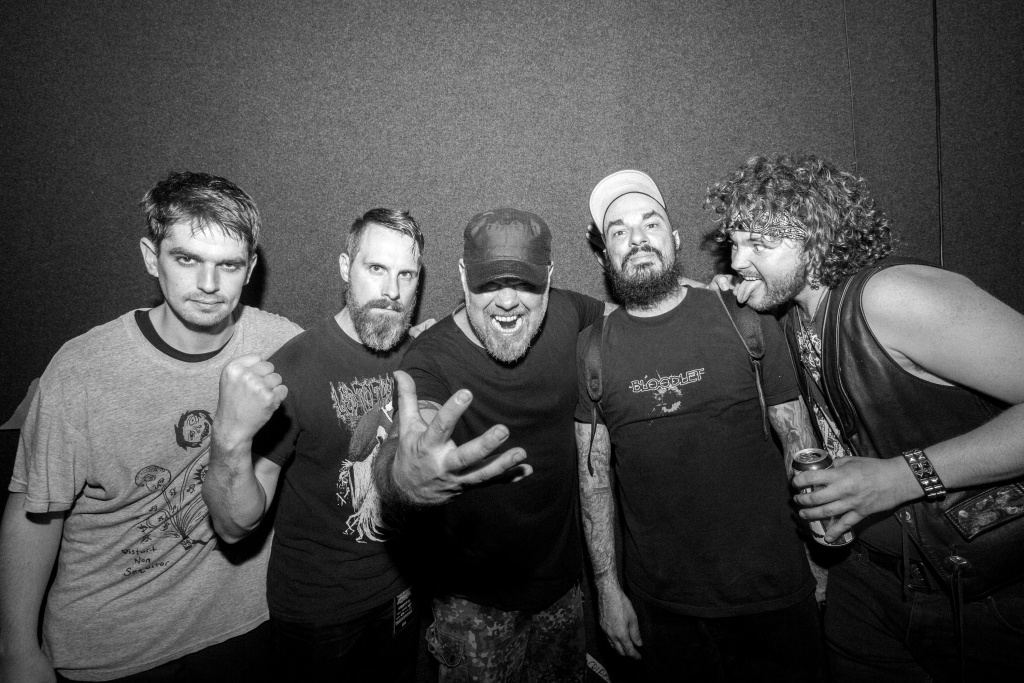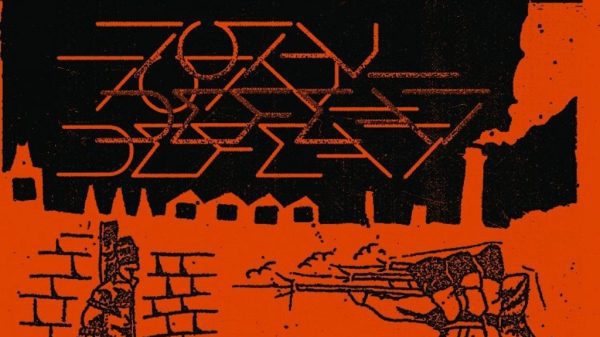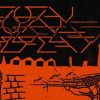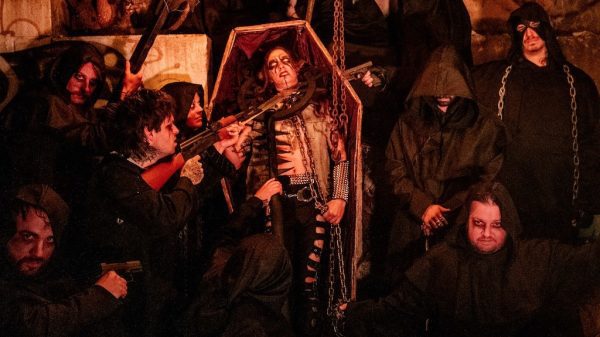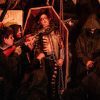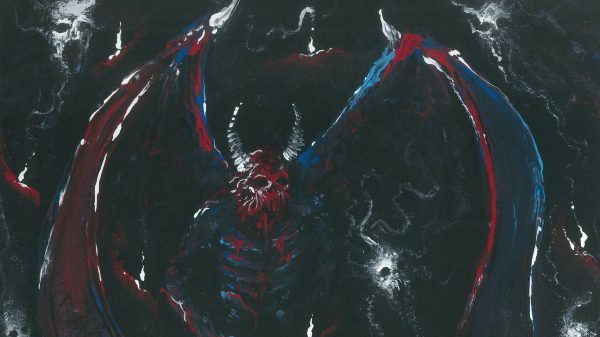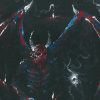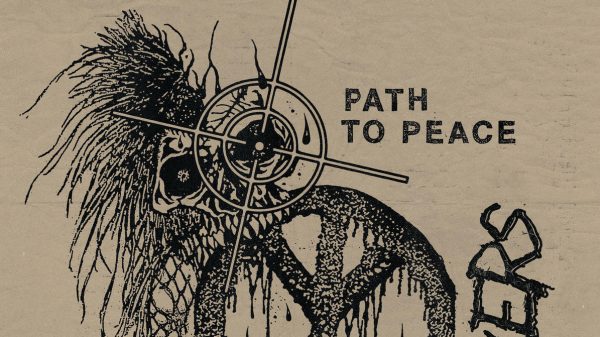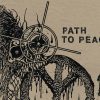Known for being one of the most incendiary and influential bands in hardcore and modern metal history, apocalyptic heavy music icons INTEGRITY formed in Cleveland in 1988 primarily as an outlet for the philosophical and spiritual musings of vocalist Dwid Hellion. With an intense sound that melds together high-velocity hardcore punk, heavy metal, thrash and angular, noisy guitar riffs with lyrical themes that include religion, the supernatural, mental illness, individualism, the occult, and Holy Terrorism, INTEGRITY are unquestionably one of the pioneering forces that forged the worlds of hardcore and metal together. Their influence on hundreds, if not thousands of bands can still be heard to this day. After their last album Howling, For the Nightmare Shall Consume, they joined forces with cult US black metal horde KRIEG for an unearthly split recording that will be out August 3rd via Relapse Records.
I talked with Dwid Hellion at Venice Hardcore Fest in Italy. INTEGRITY will return to Europe in August for performances at Brutal Assault, Roadkill, Sylak and Vagos Metal Fest before returning to the states for Psycho Las Vegas.
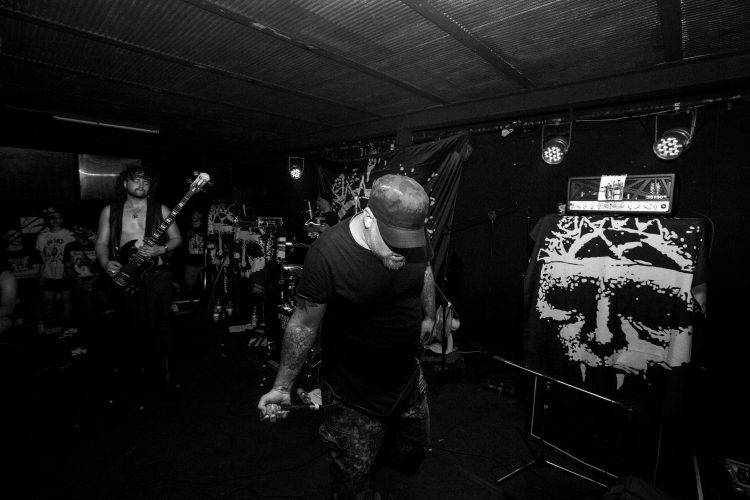
Roberto Graziano Moro
It’s been nearly one year since the release of Howling, For the Nightmare Shall Consume. Are you pleased with the response from your audience and the critics?
Dwid: Yeah. We’ve had a really good response and we were surprised to receive such a good response. Our previous records had very mixed reviews, since the beginning. And this was the only time we’ve ever had a record where most of the people seem to like it. I definitely had second thoughts about that, because I thought maybe I did something wrong. Maybe I made a record like Britney Spears or Michael Jackson or something. But yeah, it’s very nice that people enjoy it.
And are you happy about the last record?
Dwid: I love it, yeah. I mean, that’s why I make the records. I make the records because I want to hear that kind of thing and that kind of music. So the whole concept of the band is to make music that we would love to hear. And sometimes other people also like it, which makes us lucky. And sometimes people fucking hate it, which is also OK. I have no delusions, like I said jokingly about pop music. We don’t misunderstand and think that we’re making pop records. And so when people don’t like it, that’s OK. We expect that because it’s not for everybody.
I mean, it’s heavy, right?
Dwid: Yeah it’s heavy. Your grandma is going to say, “Ahh that’s fucking noise.” I mean my grandmother says that.
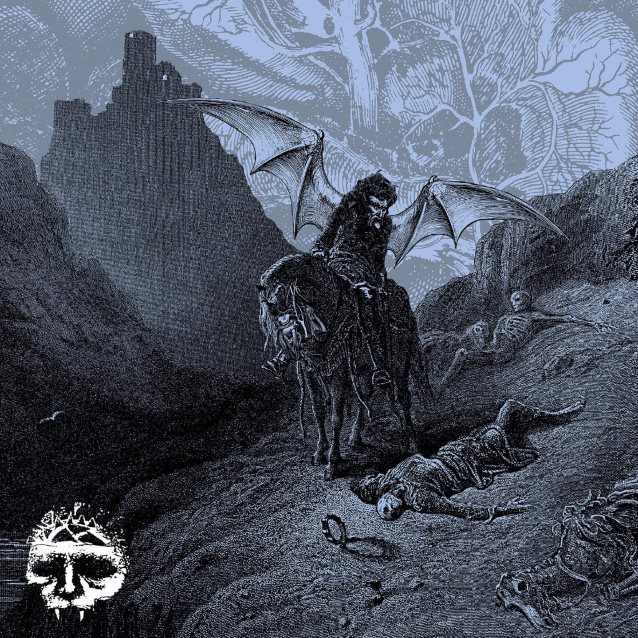
So I read that the last album was inspired by Francis Bacon. Where or what inspires you as of late?
Dwid: Too many things to answer, I guess. I’m inspired by a lot of things. My education was in art, and that’s why the Francis Bacon aspect is probably included in the album. I’m interested in things that challenge normal perception. I’m a big fan of the Dada movement, for example. Cut up poetry, so to speak, Tristan Tzara, André Breton type of things. But the visuals of that movement also inspire me. If you see the album artwork, there’s a collage, a bit abstract Dada in a way, but at the same time horrifying. Not too many of those artists touched on horror when they were doing the Dada movement.
Is there a reason why you are so into art?
Dwid: Well, I don’t know why. I just always have been. As a kid, I would draw and I would create things. And in the early 80s, my stepmother told me about this weird thing called collage, cutting up pictures and putting them together. And I started to do that. I’m 47 years old, so when I was a kid there weren’t computers in every household, there weren’t iPhones and things. So you had to do everything by hand, you had to manually create these things. And that’s what I was raised to do. That’s where I come from I guess. And when I discovered punk and heavy metal and this kind of music, it seemed to make sense with what I was doing with the art: doing your own thing, making crazy stuff. So I think that’s what attracted me to the music. I got to music from art, rather than the other way around. I think sometimes people maybe go the other way but for me it was that way.
You have been playing for almost 30 years.
Dwid: Yes, 30 years this year. 1988 to 2018.
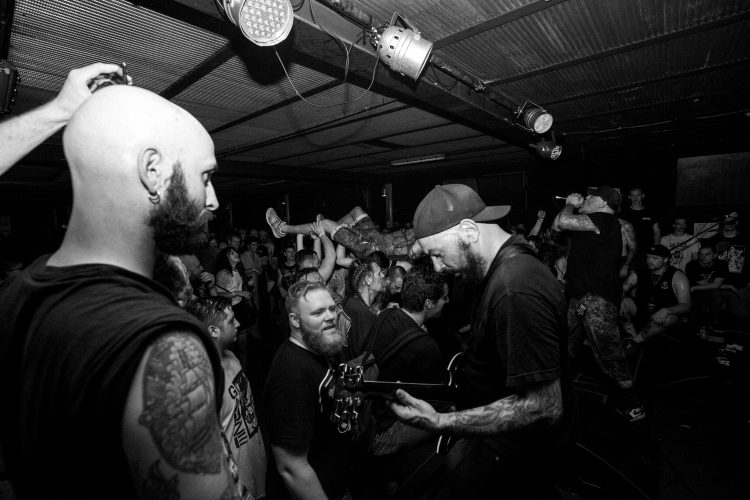
Roberto Graziano Moro
Do you think anything has changed in your way of being a musician?
Dwid: Yeah, a lot of things have changed over the years. When we first started out it was very difficult to get a recording studio to even allow us to go there because of the style of music we made. They said this is too crazy, we don’t trust this kind of music or people who make this kind of music. They thought that we were criminals because of the kind of music we made. And having tattoos and looking different was also not positive for that time. In the late 80s that wasn’t normal. So it was really complicated to even get into a recording studio. Getting the money to record wasn’t easy either. Eventually we were lucky enough to get some record contracts and were able to record. And nowadays, you can record on your phone, like you’re doing now, and broadcast video all over the world without any problem. But back then it was quite difficult.
And do you feel that you have changed as a human being?
Dwid: Of course, yeah. I’ve changed dramatically since I was 16 or 17 years old and I started the band. So yeah, I’ve definitely changed a lot, aesthetically as well as spiritually, mentally, everything.
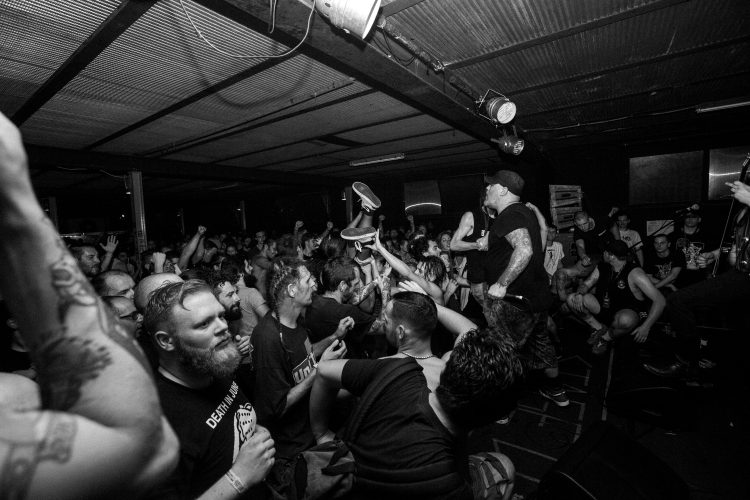
Roberto Graziano Moro
You have 12 studio albums. It’s incredible. Where do you find the inspiration to continue playing together?
Dwid: I think that it really just comes from the fact that I love music and art. And as a music fan, as an art fan, I want to see the next record of a band that I love. But I’m lucky to be in my own band that I also love so I’m able to manipulate things and make the record that I want to hear, whereas a lot of times, you might have your favorite band and you think, “I’d really love it if that band would do this or that, or go back to that sound, or go into a new sound” or whatever it is that you might imagine, might desire. I’m able to do it myself. I mean my band isn’t my only favorite band. I love many bands. I’m not trying to be an egomaniacal crazy guy about it. But I just mean that to be able to create music that I like and go in any direction that I want is a great freedom. And that’s what inspires me.
Have you ever thought about quitting?
Dwid: Yeah, many times.
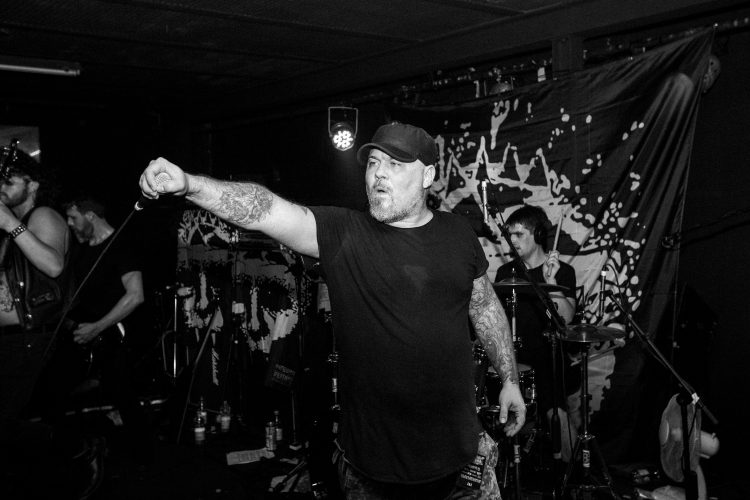
Roberto Graziano Moro
Why?
Dwid: Most of the times in the past were because I was working with record companies that were not very honest and I was struggling and I was hungry and I couldn’t pay my rent and I couldn’t take care of the things that I had to do as a person. As a normal person that needs to take care of business, take care of rent, feeding people. So many times I thought maybe this is not something that I should continue to do. And sometimes things just happened that brought me back into doing music and continuing on. It’s not an easy situation to do this kind of music, to do any kind of music, but especially yelling, loud, end-of-the-world fucking music.
You have been highly focused on religious themes in your albums. Can you talk a little bit more about the songwriting process?
Dwid: The songwriting process nowadays basically consists of me writing a loose storyboard, kind of an illustration about where I want to go. I give it a kind of color palette, different images and try to go that direction rather than saying it has to be songs that pertain to this. It’s more visual and hoping that Dom, who’s the lead guitar player, will interpret that in his own way, not necessarily my way. A little bit my way, a little bit his way and somewhere in between what he expects the band to also sound like. So we have all these different angles. It’s collaboration. But it’s also him offering his own inspiration for where he’s going with it, with a little bit of guidance, I guess. Guidance that doesn’t make sense normally in a musical way. So it isn’t really guidance in the sense that it should be structured like this musically, although sometimes that is in there. But mostly it’s about following a storyline; a visual and providing a soundtrack that could be applied to that accordingly.
So are you working on anything new?
Dwid: We have a new album that we’re writing now. A full-length album. And then there’s another record, an EP that’s coming out this summer on Relapse Records.
Do you think that, in present times, there still exists something truly alternative in the underground punk and metal scene?
Dwid: Sure, yeah. I think that people often are challenging things and doing new things and breaking rules. Whenever you do anything that’s adventurous, there’s always someone trying to put rules around that and box it in. And there’s always someone else who’s smashing those boxes. And that makes it interesting. If you don’t have those kinds of rebels, those destructive forces, then you’re not going to be able to continue to create. Even as someone who’s just interested in listening to music, that’s a very important thing to have in your musical palette: bands that are breaking the mold over and over again. Sometimes they might do it badly and sometimes they might do it fantastically, but it’s important.
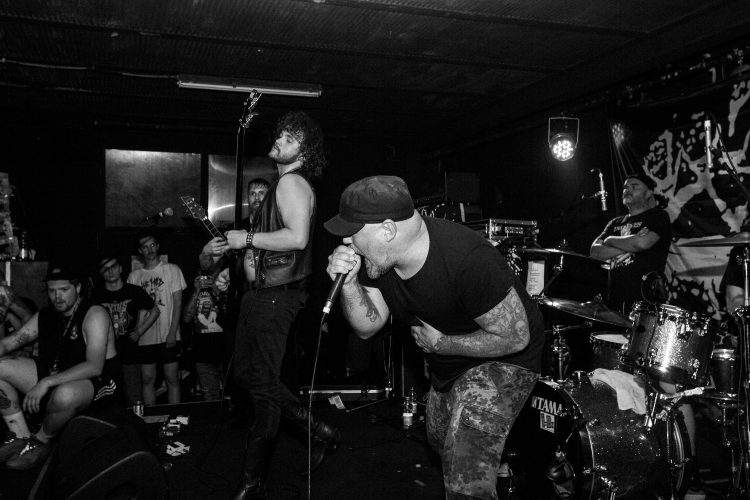
Roberto Graziano Moro
So what do you think is necessary for the music scene to be fertile in these times in which everything seems to have been done already?
Dwid: I don’t think that everything has been done. So I don’t really have the correct answer to that question. I think that people should do what they like to do. I think that’s important. Making music that you like, and also making music that involves bands that inspired you in your past, future and present. Trying to take that inspiration and putting a twist on it and changing it and making it your own. That identity that you stamp on it yourself creates something new, a new recipe. So oftentimes I think when you create something, you have a familiar quality for example, you have something familiar, whether its rock music or metal music or whatever and the structure is to follow those kinds of parameters and restraints. But then you can throw some kind of a twist on that and there are a lot of bands that are doing that, I think.
Like you did at the beginning. You put hardcore and metal together and it was maybe the first time.
Dwid: Some people say that it was. I’m not sure. But I grew up listening to lots of different bands. For example, from Italy, Raw Power was a very fantastic influence on my band and me. And the fact that they did solos at that period of time was unheard of and very inspirational to us. And I think that we owe them a great debt of gratitude for them being visionaries enough to do that, playing solos. Because I think for that kind of music, it was looked down upon. It was seen as doing hard rock. I’m not sure if they were getting this criticism, but I’m assuming that maybe they were. And I’m grateful to them for doing it anyways, for saying “Fuck you, we’ll do what we want to do.” And they’re a great band and I’m very happy to be able to play with them tonight.
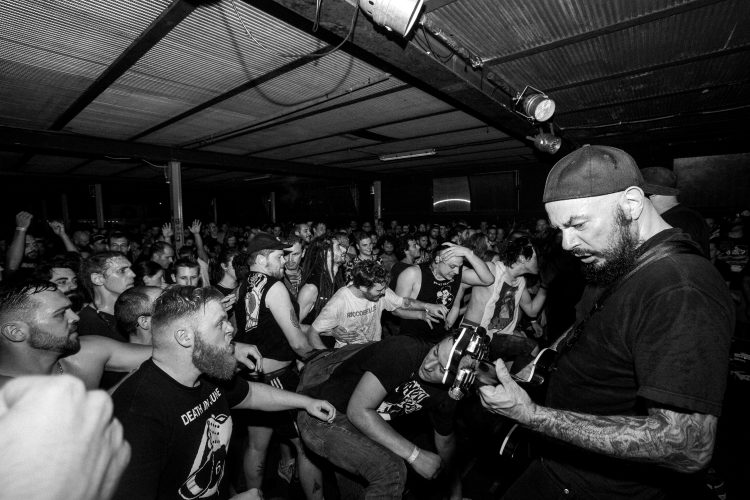
Roberto Graziano Moro
So do you have any advice for young musicians that want to play hardcore or metal?
Dwid: Yeah, play what you like, I think. If you want to talk about unfortunate stuff, there’s a lot of unfortunate qualities of music, modern music or any era of music. The most unfortunate aspect of music that I’ve ever discovered or experienced is when musicians or bands or young people who are aspiring musicians see things through the scope of what’s going to sell, what’s going to get me popular, what’s going to make people applaud me. And, you know, there are some levels to that, because of course you don’t want to make just pure shit. But at the same time, you want to make something that expresses what you believe and what you love, what’s a passion to you. And a lot of time people mistake that as just vomiting up or regurgitating what they hear on the radio, what they see as popular today. If we were to start a band you and I today, and we’re going to base it off of what’s popular right now, one year from now when our band is ready to go in the studio, well that was last year’s popular and we’ve already missed the fucking boat. So that’s a stupid thing to chase. You’re chasing a ghost. You’re never going to catch that ghost and it’s a dumb fucking thing to do anyways because it’s not yourself. It’s fake; it’s cosplay; it’s bullshit. But when you’re doing something that you’re passionate about, and I think Italian people are very passionate people, you could put your heart into it and your soul and everything you fucking have and you’re going to be able to make something that even if the only person that it touches is you, that’s all that matters. At the end of the day, that’s the only person that matters. If you’re trying to please other people you’re always going to fall short because you can never know what pleases these other people. But you can always know what makes you feel like your hair is standing and brings tears to your eyes, you know.
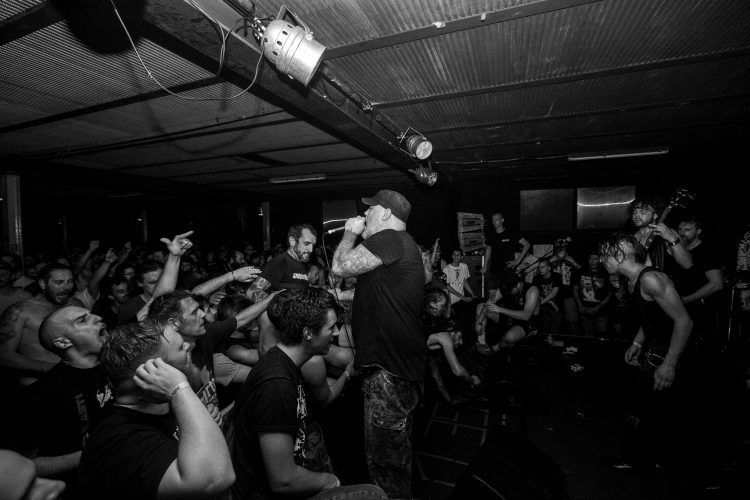
Roberto Graziano Moro

